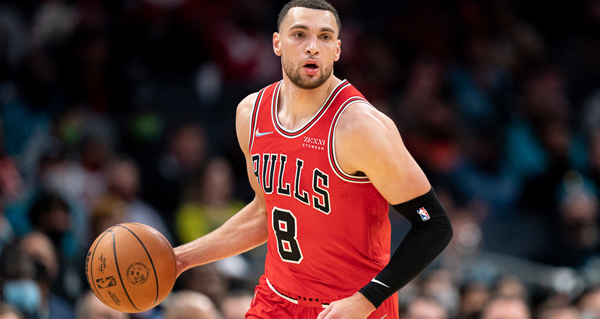Zach LaVine’s seventh season with the Chicago Bulls is looking like his last, and it probably won’t be a full one. After years of rumors suggesting his team was less than fully committed to him, and certainly interested in listening to trade offers, LaVine and the Bulls agreed to a five-year, $215 million contract in the summer of 2022. It was a matter of business, not preference: LaVine was a two-time All-Star and an efficient volume scorer, making him roughly one of the best fifty players in the NBA, all of whom have the negotiating power to get equivalent money somewhere in the league—and neither side, in this case, had an immediate path to participate in that ecosystem of talent exchange without one another.
It’s not exactly clear that LaVine and the Bulls don’t, in some suboptimal sense, still need each other. What is crystally evident, though, is that their desire to work together, never terribly strong, has eroded into the bone of their player/organization relationship. This Tuesday, it was reported that LaVine is now all but formally requesting a trade, meeting his team’s frequent overtures around the sport to turn him into something else. Later in the day, he was on television with his agent Rich Paul, both sporting Klutch Sports Group t-shirts in Chicago as they took in a premiere NCAA contest. When caught by the camera, LaVine smiled in a way that Chicago has not yet seen this season.
LaVine is having a bad year. At 41 percent from the field and 31 percent from three, he is well below his career averages of 46 and 38; and if you know anything about LaVine, you know that without efficient scoring, you’re certainly not getting much else. He has not been a meaningful playmaker, decision maker, or defender, despite his tremendous physical talents. Teams around the NBA know this as well as Bulls fans do, which is why the large bounty Chicago has sought for their unsatisfactory star player has not materialized. It won’t now, either.
LaVine trade scenarios are decidedly finite because of the largesse of his salary, which will cost some team through the Spring of 2027. The salary cap will jump, but $40 million will remain a chunky percentage of anyone’s spending capacity. Acquiring him is no trial balloon affair, and will require serious belief in, and commitment to, his abilities from now until his 32nd birthday. One common perception about this circumstance, which I submit again in this column, is that such devotion is wise only if he is paired with the proper teammate. Namely, an A1 superstar whose status as a primary ball handler and floor general is both complementary to LaVine and so entrenched that he wouldn’t question it. LeBron James comes to mind, not least of all because of his shared agent and LaVine’s unhidden desire to be a Laker—he wears No. 8 on his jersey for a reason.
James is on a short list of figures large enough for LaVine to make himself subjugate to them. Otherwise, any team that brings him in might suffer, as Chicago has, from his anxiety about his stature in the basketball world. This destructive insecurity has been visible to Bulls fans in manifold ways, but most of all about one year ago when he struggled to start the season after getting knee surgery the previous summer, while tacitly denying that these expected difficulties were occurring. After being benched during a 1-for-14 shooting performance in a loss to the Orlando Magic, he objected to coach Billy Donovan’s decision during post-game media availability, contending that “you play a guy like me down the stretch.”
His relationship with the team, already lukewarm in many ways, has been even more tenuous since. Donovan didn't experience similar drama or accusations of disrespect from the much larger stars he coached before: Kevin Durant, Russell Westbrook, Paul George, Chris Paul, Carmelo Anthony. And the Bulls front office is committed to their coach, who they've extended into long-term job security. Concerns about LaVine's happiness in Chicago have increasingly swirled, his fit with DeMar DeRozan and Nikolas Vucevic looking progressively crappy.
All three, in variously passive aggressive ways, have suggested with both words and body language that the offense should be more oriented around their skill sets. And here we see the most telltale mark of mediocrity: ego battles without success—arguing over a slice of pie instead of seeking out the whole thing, squabbling over a street corner without ever walking around the block. The Bulls might have no route to championship glory or anything like it, but they can free themselves from such provincial, lifeless bickering.



